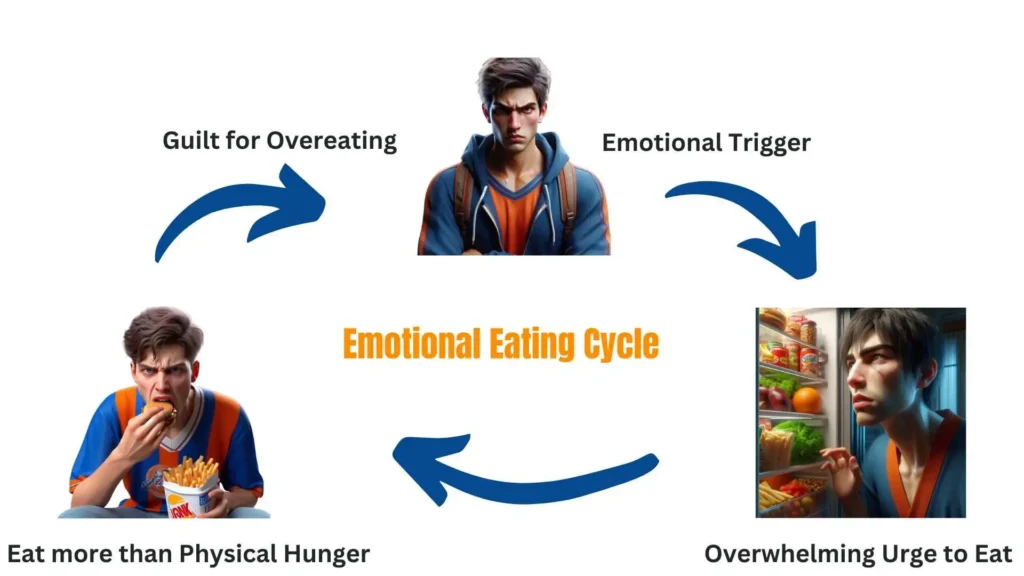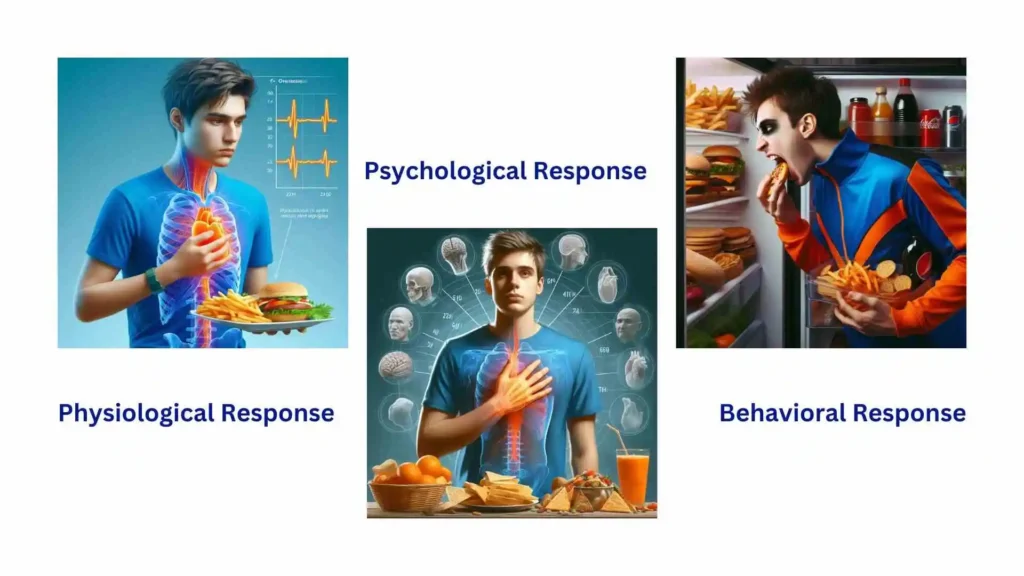Food becomes a source of pleasure and distraction when anger strikes you. But do you know how can anger affect eating habits? And do you want to control it before it controls you? Then you are at the right place!
Hold on! Let’s begin with a quote,
As Lawrence Douglas Wilder said, “Anger doesn’t solve anything. It builds nothing, but it can destroy everything”. Therefore, anger affects not only your eating habits but also your physical and mental health, leading to obesity and hypertension.
This blog will help you make sense of what, when, and how anger affects your eating habits.
Table of Contents
What is Emotional Eating?
Why do we eat food? To gain energy and fulfill bodily needs. But do we always eat for survival? No. Sometimes, we eat food to cope with our emotions, also known as emotional eating.
Food becomes a source for distracting ourselves from the emotional breakdowns we face. In this case, most of us turn to food for comfort, stress relief, or reward.
Why do I Emotionally Eat?
The effects of anger on eating are directly linked to the emotional eating cycle. Due to the cycle, we often eat emotionally. This is:

- The cycle begins when you face a sudden setback or something that triggers you emotionally, either happy or stressed.
- Then, you feel a sudden overwhelming urge to eat as a reward or punishment.
- As a result, you eat more than your body requirements in the form of junk or unhealthy food.
- Eating may please you initially, but the emotions that trigger the eating process are still there. And you feel even worse for consuming extra calories, feeling powerless over both your food and mood.
Difference between Emotional and Physical Hunger
Moreover, learning the difference between emotional and physical hunger is essential as it will help in understanding how anger can affect eating habits.
| Emotional Hunger | Physical Hunger |
|---|---|
| Comes on suddenly | Comes on gradually |
| Craves comfort food like junk | Open to options and variety |
| Requires instant satisfaction | Does not require instant satisfaction |
| Trigger feelings of guilt, shame, and powerlessness | Does not trigger feelings of guilt, shame, or powerlessness |
How to Avoid Emotional Eating?
After learning about the emotional eating cycle and the difference between emotional and physical hunger, we can learn steps to avoid emotional eating. It also helps us take specific steps to manage anger that affects our eating habits. The steps are as follows:
- Firstly, we need to identify the trigger; primarily, emotional eating is linked to unpleasant events. But it can also be triggered by positive feelings or emotions, such as rewarding yourself for achieving a goal.
- Secondly, you can keep a diary that records your emotional eating. Whenever you feel an urge to eat as a coping mechanism, take a moment to figure out the reasons compelling you to eat.
- Lastly, the most crucial step is to find alternatives to emotional eating. And you could also reward yourself for not indulging in emotional eating. For instance, if you are depressed or anxious, instead of feeling comfort by eating, you can call a friend or even read a book.
Different Emotions Affecting Eating Habits
Almost anything can trigger a desire to eat. Emotions are essential in our lives; sometimes, people eat to cope with their feelings. Let’s explore a few emotions, including anger affecting eating habits, such as:
Happiness
People may turn to overeating as a reward for achieving their goals or celebrating their success. It can include celebratory eating, social eating, and craving for rewarding foods.
Suppose one of your group members excels in the examination. To celebrate their success, you ask for a treat, i.e., pizza, a burger, or other fast food. As a result, happiness leads you to become a prey of overeating.
Boredom
When eating is your primary emotional coping mechanism, you open the refrigerator to find something to munch on. Boredom leads to overeating; all of us go through the same emotional states.
Whenever we are bored and don’t find any productive activity, we will fetch something to eat. This happens not because we are hungry or our body needs the energy to work but because we find eating fun.
Stress
Does stress cause hunger? Yes, stress can influence eating habits, but the effect of stress varies from person to person. The relationship between stress and appetite is complex.
Some may indulge in over-eating; others may find a decrease in their appetite; others find solace in selective cravings. Stress affects eating habits and leads to weight gain and potential health issues.
Anger
Like other emotions, anger also affects the eating habits. There are different and varied ways in which anger shows its effects; it may take some towards overeating.
However, eating during the heightened state of anger has various detrimental effects on the human body. Eating while you are angry impacts the amount of food you intake. It also affects your digestive system.
How can Anger Affect Eating habits?
Anger and stress go hand in hand despite different emotions. Anger, like stress, triggers different responses in the human body, which lead to various consequences.

I. Physiological Responses
Anger triggers physiological responses in your body that can influence weight gain. Like stress, anger also leads to emotional eating as a coping mechanism for intense feelings, as it is a common way to provide temporary relief and comfort.
Anger affects your eating habits by triggering physiological responses of overeating. When you feel irritated with something, you may turn to overeating or eating high-calorie food.
For instance, choosing junk or unhealthy food will ultimately lead to obesity or weight gain.
II. Psychological Responses
Anger leads to the release of hormones that prepare the body for action, such as adrenaline and noradrenaline.
These can affect the metabolism and digestive system in the short run. Chronic anger causes hormonal imbalance. It can disrupt normal metabolism and lead to fat accumulation in the body.
Anger or stress affects eating behaviors by releasing stress hormones, such as cortisol, and preparing the body for “fight or flight” responses.
The hormonal imbalance caused by chronic stress results in cravings for unhealthy foods, which in turn results in weight gain.
III. Behavioral Responses
The effects of anger on eating habits can be seen in behavioral responses to food. These include:
- Binge eating/ Overeating: Consuming large amounts of food in a short period.
- Impulsive eating: Intake of an enormous quantity of food for immediate gratification or satisfaction.
- Mindless eating: Eating food due to emotional hunger and not physical hunger.
- Cravings for a specific food
- Restricted eating habits: In which individuals use food restrictions to punish themselves.
Why you should Avoid Emotional Eating
You have heard the idiom, “You are what you eat.” But in the case of emotional eating, it also includes “you are when and how you eat.”
Eating under stressful situations or when you are angry has long-standing devastating impacts on your body.
Now you understand how anger affects eating habits, so let’s delve into the reasons for avoiding emotional eating, especially during anger. These reasons include:
- When you are angry, your blood pressure and stress hormones are heightened. If you eat during this situation, it will cause a further increase in blood pressure, which can be fatal.
- The increased level of stress hormones, i.e., cortisol, also results in difficulty in digesting.
- Eating during anger also affects digestion, resulting in bloating, stomach acidity, and acid reflux.
- It also affects your immune system, breaking the protective barriers of the intestine. It gives way to intestinal bacteria entering your bloodstream. And as an outcome, you are open to autoimmune diseases and diarrhea.
- Other reasons may include unhealthy food choices made during anger. Like comfort food, those high in sugar, salt, and fats like ice cream, and snacking or fast food.
- Eating more food also results in tooth decay, gum diseases, and bad breath. Therefore, you could also learn the best ways to brush your teeth habitually to prevent yourself from tooth falls.
Strategies for Managing Anger-Induced Eating
Let us discuss a few strategies that can help us manage the effects of anger on eating habits. These are:
1. Distraction
When you are angry, try to find distractions for yourself. Instead of eating, you can indulge in productive activities like painting, reading a book, talking with a friend, or walking.
Some may start hair-twirling in anger; you can also learn how to distract yourself from hair-twirling habits.
2. Mindfulness
It involves paying full attention to eating. You don’t take food as a comforter but think about it as a way to get nutrition. Before consuming any food during anger, take a moment to think and activate your sensations to make sure you are eating healthy.
3. Exercises
Doing physical exercises has been proven fruitful in minimizing the effects of anger on eating habits. You can incorporate regular exercise in your routine, such as yoga, sports, and jogging.
It proves an effective way to release tension and save you from eating food during times of anger. Learn easy ways to make exercise a habit.
4. Breathing and Relaxation Exercises
Anger may also lead to grunting habits. Practicing relaxation and breathing exercises can help develop a sense of calmness and reduce stress. Thus, it makes it easier to manage anger without turning to food and grunting habits.
5. Professional Help
If you are unable to control yourself from eating during anger, then seek professional support. You can also join anger management classes in which a therapist and professional will help you. They will provide strategies to manage anger and its effects on eating habits.
How Does Anger Affect My Eating Habits?
Anger, like any other emotion, is an essential component of humans. Anger also affected my eating habits. Whenever I was triggered emotionally, I saw myself indulging in eating more than my bodily requirements.
Due to certain factors, such as educational pressure and not getting the required input from other members of the group in group tasks, I got angry. As a result, I consume more junk food like pizza, burgers, pasta, chips, etc.
As a consequence of eating unhealthier and junk food in my heightened state of anger, I got overweight. The guilt and shame that I suffered later because of my weight made me feel even worse.
To overcome this habit of overeating and to reduce my weight, I started engaging myself in different activities by following the strategies. Like,
- I started to read novels, watch dramas, do some household chores, and write as a distraction for eating.
- Secondly, I sought professional help from a nutritionist, who helped me schedule my diet plan.
- Lastly, I tried to develop exercise habits like stretching, relaxation, and breathing exercises.
Do not let anger affect you the way it affected me. Following the earlier strategies could help you recover from this habit of overeating in anger.
Conclusion
Anger affects eating habits by inducing physiological, psychological, and behavioral responses. These effects can be eliminated by understanding how to avoid emotional and anger-induced eating.
Also, there are various reasons to avoid eating during times of anger. Different strategies such as distraction, mindfulness, exercise, and professional help to reduce the effects of anger on eating habits.
You could also share this guide with your friends and family members to help them recover from this destructive habit of turning to food when anger hits them. SHARING IS CARING!
FAQs
Is emotional eating a disorder?
Emotional eating itself is not a disorder. It is a common human emotion but can become problematic when used as a primary coping mechanism for specific emotions. Moreover, it is a symptom of other eating disorders or mental health conditions, such as Binge Eating Disorder (BED) and healthy vs. unhealthy emotional eating.
What causes stress eating?
Like any other emotional eating, stress eating is caused in response to emotional rather than physical hunger. It results from hormonal imbalances such as cortisol, lack of mindful eating, dynamic regulations, social and cultural responses, and habitual responses.
Can diet affect hunger?
Yes, diet affects hunger. The type of food you intake, its nutritional composition, and the overall structure of your diet will affect your hunger level. For instance, there is evidence that bulk, i.e., fiber intake, reduces appetite.




